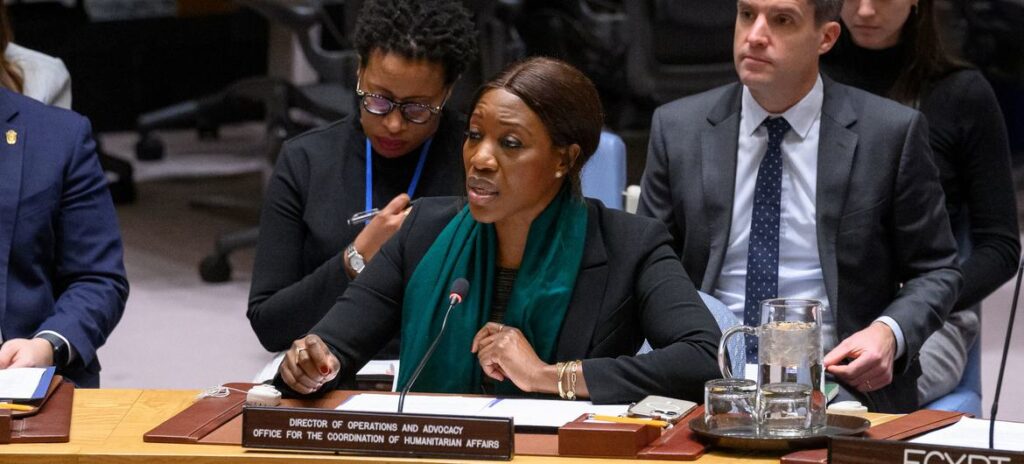Hunger and starvation in Sudan are spreading because of decisions made each day to continue the conflict, irrespective of civilian cost, United Nations aid officials told the Security Council on Monday, as they urged members to push for a ceasefire and the lifting of restrictions impeding humanitarian work.
“This is a man-made crisis,” Edem Wosornu, Director of Operations and Advocacy Division, Office for the Coordination of Humanitarian Affairs, stressed in her briefing to the 15-member organ.
The latest from the Integrated Food Security Phase Classification (IPC) is “shocking, but sadly, not surprising”, she continued. Analysis indicates that famine conditions are now present in five areas, including Zamzam, Al Salam and Abu Shouk internally displaced persons camps, and in the Western Nuba Mountains. The findings project that five additional locations — all in North Darfur — will be affected between now and May, with a risk of famine in 17 other areas.
More than 11.5 million people have been internally displaced in Sudan since fighting erupted in 2023, while more than 3.2 million others have fled to neighboring countries. Humanitarian workers are risking their lives to carry out their duties. Just last month, three World Food Programme (WFP) workers were killed by an air strike on their compound in Yabus, in Blue Nile State.
Despite the increasing danger, there has been some progress. On 25 December 2024, a convoy of 28 trucks arrived in Khartoum with food, nutrition supplies, and other assistance — the largest UN convoy to reach the capital since the beginning of the crisis and following many weeks of negotiations.
But, inside some areas of Darfur, additional restrictions are being imposed on the work of humanitarian organizations. New inspection procedures for trucks are creating further bottlenecks and visas for humanitarian personnel are not being granted swiftly enough.
“We need your help to press the parties to comply with international humanitarian law,” she stressed, urging for an immediate cessation of hostilities and for “real and inclusive” steps towards lasting peace that the people of Sudan “so desperately need”.
All routes via roads and air across conflict lines and borders must be open for relief supplies and humanitarian personnel. Funds are critically needed, as well. The 2025 Sudan Humanitarian Needs and Response Plan will require a record $4.2 billion to support close to 21 million people. A further $1.8 billion is needed to support 5 million people in seven neighboring countries.
Beth Bechdol, Deputy Director-General of the UN Food and Agriculture Organization (FAO), also briefing the Council, recalled how, in August 2024, famine was classified in Zamzam camp in Sudan’s North Darfur State. “It persists and it has expanded,” she warned, stressing that famine conditions have spread to other sites in North Darfur and to the Western Nuba Mountains.
“The risk of famine and its spread has been on our collective conscience since August, and now it is here, not only with people dying from hunger but also with a breakdown of health systems, livelihoods and social structures,” she went on to say.
Sustained violence and economic turmoil have disrupted markets and driven prices of staple goods to unaffordable levels. Nearly two-thirds of the Sudanese people depend on agriculture. Production loss of vital crops, such as sorghum, millet and wheat, represent an economic hit estimated into the billions of dollars.
“We need your political leverage to end hostilities and to bring relief to the people of Sudan,” she added, emphasizing that, in 2025, FAO plans to reach over 14 million people with the seeds, livestock feed and fishing supplies they need to produce their nutritious food.
In the ensuing discussion, Council members stressed the need for an immediate ceasefire in Sudan and urged conflicting parties to respect international humanitarian law and lift roadblocks for humanitarian organizations to be able to carry out their life-saving work.




